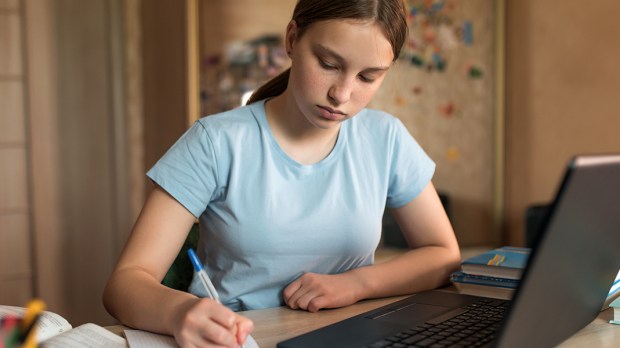Lenten Campaign 2025
This content is free of charge, as are all our articles.
Support us with a donation that is tax-deductible and enable us to continue to reach millions of readers.
I have been teaching online for over two months now. Students, teachers, and administrators are all struggling with it. And no one that I have talked to is especially fond of it. Noteworthy limitations are built into online education: lack of authentic personal interaction, the danger of cheating, and the toll isolation takes on teenagers, to name a few.
But instead of focusing on all that, I am going to describe one potential benefit of this educational situation: students might take ownership of their learning. Such ownership floats before the mind’s eye of the teacher constantly: equipping students to desire knowledge for its own sake and to learn on their own. The goal is lofty, and perhaps a touch ambitious in grade school or high school. But it is not absurd. It is attainable. Because knowledge is a good thing: we love it for its own sake. Everyone ought to know (and rejoice in knowing) that God is Triune, that y=mx+b, or that the “I” usually goes before “e.”
Now that we are not there in person to prod and encourage the students, they could learn something about themselves and their own desires. What do they love? Knowledge or passive entertainment? Excellence or mediocrity? Just because I am writing about kids does not mean adults can pass over these questions. We are learning painful lessons about ourselves too in our work from home. But perhaps, in the case of the kids, this bizarre form of house arrest will help them towards ownership of learning. Maybe, just maybe, they can learn a lesson that we could never have taught them in the supportive environment of the classroom: teachers assist learning, but the student must want it. She is the primary agent in that process. The promise of As and the threat of Fs can only do so much.
First, I present a caveat on “ownership of learning.” There are many books, articles, and professional development courses organized around this concept. My views are my own and are informed by my Dominican education. I am not sure they would be representative of the teaching profession.
Ownership looks like this: understanding, desire, and memory. First, students must understand what an author (biologist, novelist, theologian, etc.) is saying. Then, having enjoyed understanding the material, their desire to learn about a subject is provoked. Lastly, the material becomes part of them.
Understanding sounds simple. But appreciating what an author is really saying and what he is reallynot saying offers a difficult challenge. This is especially true in theology, where students arrive with prejudices from the ambient culture. Moral theology presents ample opportunity for misunderstanding. I clear up these sorts of misunderstandings more easily in person. Left on her own, a student must concentrate hard to understand what the textbook says about the purpose of marriage, for example. They now have more time to read and re-read the words of the textbook. And this struggle with the material produces understanding. I am constantly tempted to short-circuit this process. In a physical classroom, they have a question, and I have an answer. After I speak, they are convinced of sacred truth, and everything is great. Except that is not what happens. Instead, they read something, do not understand it, ask for clarification based on fear of Friday’s test, and then forget what they never have understood in the first place. Now, in their quarantine, they have the material and themselves, without much help from me.
Desire can be for all sorts of noble or shameful things. But, intellectually, successful grappling with hard concepts leads a desire to know more. We teachers remember our first real, unaided success at proving a theorem, translating a paragraph, or understanding the causes of a war. Only after that first small success can we desire and like studying geometry, Spanish, or history. This joy, desire, or passion springs from an interest and small successes in pursuing that interest. These successes compound and build true knowledge. This is a change in the student. It is a change from the true lack of such knowledge back in September. And, who knows, their present home-bound boredom might beget an interest in European geography or cell walls.
Lastly, their solitude can build memory. The Christians of former times trained their memories arduously, and we sometimes outsource or entirely neglect ours. But long stretches of time alone can train them. Here is an opportunity to build up knowledge which they can access for the rest of their lives.
This is the chance these kids have now. Despite the Herculean efforts of teachers, staff, and administrators (administrator hours are especially grueling), the students are nearly on their own with sources of knowledge. It must make it off the page (or screen) and into their souls. But they have the gifts, time, and grace to do that now. My students frankly impress me by their diligence. Perhaps they will never have this much idle time again in their lives. I am not naive, and I know they could spend all this free time on Stranger Things. But then again, they might not. And perhaps some great future intellectuals will be awakened in quarantine.

